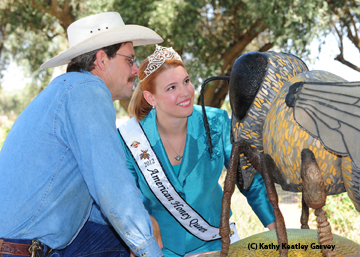
Brian Fishback, volunteer at the Harry H. Laidlaw Jr. Honey Bee Research Facility at UC Davis, shows American Honey Bee Queen Alyssa Fine the bee sculpture in the Haagen-Dazs Honey Bee Haven. (Photo by Kathy Keatley Garvey)
News
Spreading the Word About the Beekeeping Industry Is Just 'Fine' with Alyssa Fine
(July 18, 2012)
DAVIS--When youngsters meet Alyssa Fine, the first thing they ask is “Do you ever get stung?”
They also ask if the bee population is “still” declining and if she’s a beekeeper.
Yes, yes, and yes.
Alyssa Fine, 23, of Monongahela, Penn., is accustomed to answering questions. As the 2012 American Honey Bee Queen, sponsored by the American Beekeeping Federation, she’s an ambassador to the beekeeping and honey industries. One of her responsibilities is to educate the public about the importance of bees and the merits of honey.
And that’s just “fine” with her. “I really enjoy this,” she said.
Fine, a 2010 graduate of Pennsylvania State University with a bachelor’s degree in agribusiness management, is spending 11 days in California, one of some 23 states on her itinerary during her yearlong role as the American Honey Bee Queen.
On Wednesday, July 18, accompanied by her host Brian Fishback of Wilton, a veteran beekeeper and volunteer at the Harry H. Laidlaw Jr. Honey Bee Research Facility at the University of California, Davis, Fine toured the bee research facility and the adjacent Haagen-Dazs Honey Bee Haven.
She met honey bee and native bee scientists and admired the haven’s morphologically correct six-foot-long ceramic sculpture of a worker bee. The sculpture, created by Donna Billick of Davis, anchors the half-acre pollinator garden.
No stranger to bees, Fine works at the family business, the Fine Family Apiary, located in Monongahela, Pa., about 20 miles south of Pittsburgh.
She and her parents, Albert and Darlene Fine and two sisters, Danica, 18, and Chloe, 14, keep about 150 hives and sell honey at farmers’ markets, at country stores, and via word of mouth. They also offer pollination services on area farms. .
Last year their hives yielded about 5000 pounds of honey. This year, due to the drought, the family expects less.
“I’ve been around bees since I was born,” said Alyssa, who was born and reared in Monongahela. Her earliest childhood memories include running through a field of clover and getting stung by a bee; enjoying fresh comb honey on the front porch, and creating scores of school projects on honey bees. Today her involvement with the family apiary (Italian, Carniolan and Russian bees), focuses on developing beeswax cosmetics.
Fine enjoys meeting the public and listening to the stories that parents and their children tell her. One conversation excitedly began with “My cousin’s dad’s brother’s uncle saw a bee in the yard!”
“I hear the bees are disappearing,” another youngster told her. “Have you got it figured out?”
Colony collapse disorder (CCD) is still prevalent, Fine tells them, explaining that the mysterious phenomenon is characterized by adult bees abandoning the hive, leaving behind the queen, the brood and food stores. Scientists attribute CCD to a multitude of factors, including pests, parasites, pesticides, diseases, stress and malnutrition, according to Extension apiculturist Eric Mussen of the UC Davis Department of Entomology.
Fine speaks at state and county fairs, festivals, schools, beekeeping association meetings and to the news media, spreading the word about the importance of bees. One third of the American diet is pollinated by honey bees.
Fine also works closely with youth development groups, including Girl Scouts, 4-H, Boy Scouts, and with home-schooled children. She hopes to “help bring back the beekeeping badge” for Girl Scouts.
Fine monitors the American Beekeeping Federation’s Facebook page, and the kids’ blog, buzzingacrossamerica.com. In her leisure time, she knits, reads, and writes short stories and poetry. “Reading--that’s mostly on the airplane now,” she said.
Over the next several days, California State Fair visitors can see Alyssa Fine at the Insect Pavilion where she greets the public, hands out honey-based recipes, and answers questions in front of Brian Fishbank’s bee observation hive. On Friday, July 20, she’ll offer a cooking demonstration on honey (preparing glazed skillet chicken, cole slaw and lemonade) at 2 p.m. at The Farm, where she will explain “how honey is a healthy substitute for sugar, how honey extends the shelf life of baked products and how it adds that extra special something, taste or texture to other products.”
Alyssa Fine leaves for Ohio on July 24. Next on her itinerary: the Ohio State Fair and the Indiana State Fair. She’ll be celebrating National Honey Bee Awareness Day on Aug. 18 in Florida.
Meanwhile, she’s enjoying life on the Brian and Darla Fishback farm, the BD Ranch and Apiary. She’s met their two children, 20-month-old Emily and one-month-old Jane; the millions of bees hived in their 100 colonies; and the 35 goats, 26 chickens, five cats and three dogs.
Fishback, a member of the American Beekeeping Federation, the California State Beekeepers’ Association and a past president of the Sacramento Area Beekeepers’ Association, has hosted the American Honey Bee Queen for the past three years.
“It’s really good for public education, for people to learn about the importance of bees and the industry,” Fishback said.